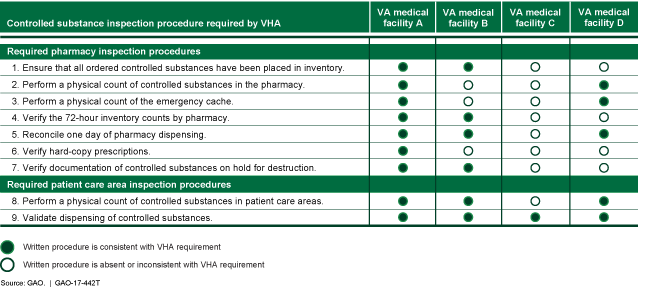VA Health Care: Actions Needed to Ensure Medical Facilities' Controlled Substance Programs Meet Requirements
Fast Facts
The Veterans Health Administration requires that each of its medical facilities have an inspection program to monitor how staff dispenses controlled substances. Inspectors check, for example, that opioids that are dispensed from machines have a valid doctor’s order and are administered to patients.
However, we found that some VHA facilities did not conduct all monthly inspections or follow all required inspection procedures. We recommended in our report (on which this testimony is based) that VHA ensure that its inspection programs are in line with its policy, and establish procedures to prevent missed inspections.
Comparison of Written Inspection Procedures at Four VA Medical Facilities with Selected VHA Inspection Requirements, as of February 2016

Chart showing inconsistencies in written inspection procedures for February 2016.
Highlights
What GAO Found
GAO found weaknesses in the way four selected Department of Veterans Affairs (VA) medical facilities were implementing their controlled substance inspection programs. Two of the four did not conduct monthly inspections of controlled substances as required by the Veterans Health Administration (VHA). For example, one facility missed 43 percent of monthly inspections in critical patient care areas and the pharmacy for the period GAO reviewed--January 2015 to February 2016. Further, inspections that three of the four facilities performed did not include or follow three or more of the nine VHA requirements GAO reviewed. At two of the three facilities, for example, inspectors did not properly verify that controlled substances had been transferred from VA pharmacies to patient care areas; nor did inspectors ensure that all controlled substances on hold for destruction were properly documented. The VA Office of the Inspector General identified similar inspection program weaknesses at other VA facilities in 2009 and again in 2014.
GAO found that several factors contributed to nonadherence to VHA policy at selected facilities. First, the two facilities that missed inspections lacked an additional control procedure--such as the use of an alternate controlled substance coordinator--to help prevent missed inspections when inspectors could not conduct them due to professional or other personal responsibilities. Second, while facilities develop their own set of inspection procedures that must follow VHA's policy requirements, three of the four facilities did not ensure their written procedures included the nine VHA program requirements GAO reviewed. Third, VHA relies on coordinators at the facilities to ensure that the inspections are completed appropriately, but GAO found that VHA's training course for the coordinators does not focus on its required inspection procedures. As a result of these weaknesses, VHA cannot ensure that its inspection programs are following all of its requirements.
GAO found inconsistent oversight at the selected facilities of their controlled substance inspection programs by facility directors and the Veterans Integrated Service Networks (network) to which the facilities report. VHA assigns oversight responsibilities to each facility director and network. GAO found that directors at two of the four selected VA medical facilities had not implemented corrective actions to address missed inspections identified in the monthly inspection reports. In addition, two of the four selected networks did not review their facilities' quarterly trend reports, as required by VHA. Such reports identify inspection program trends such as missed inspections and areas for improvement. GAO found that one network that had reviewed the trend reports failed to follow up with a facility to ensure it had submitted missed trend reports. Inconsistent oversight by the directors and networks is contrary to federal internal control standards that state oversight should be ongoing to assess performance and promptly remediate deficiencies in order to achieve objectives, including holding individuals accountable for their responsibilities. Without effective oversight of the inspection programs by directors and networks, VHA lacks reasonable assurance that its programs are being implemented as required to prevent and identify diversion of controlled substances.
Why GAO Did This Study
This testimony summarizes the information contained in GAO's February 2017 report, entitled VA Health Care: Actions Needed to Ensure Medical Facility Controlled Substance Inspection Programs Meet Agency Requirements, GAO-17-242.
For more information, contact Randall B. Williamson at (202) 512-7114 or williamsonr@gao.gov.
